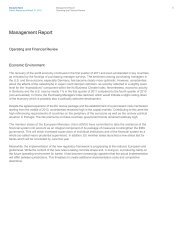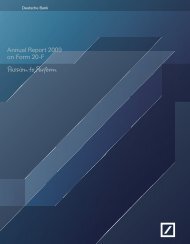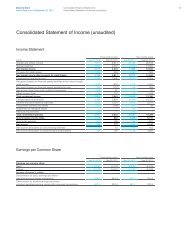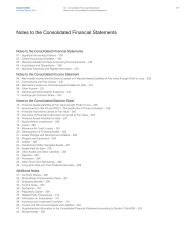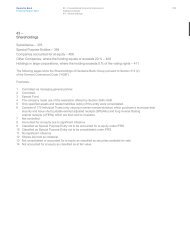- Page 1: Deutsche Bank Annual Report 2010 on
- Page 4 and 5: Deutsche Bank Annual Report 2010 on
- Page 6 and 7: Deutsche Bank Annual Report 2010 on
- Page 8 and 9: Deutsche Bank Annual Report 2010 on
- Page 11 and 12: Deutsche Bank Item 3: Key Informati
- Page 13 and 14: Deutsche Bank Item 3: Key Informati
- Page 15 and 16: Deutsche Bank Item 3: Key Informati
- Page 17 and 18: Deutsche Bank Item 3: Key Informati
- Page 19: Deutsche Bank Item 3: Key Informati
- Page 23 and 24: Deutsche Bank Item 3: Key Informati
- Page 25 and 26: Deutsche Bank Item 3: Key Informati
- Page 27 and 28: Deutsche Bank Item 3: Key Informati
- Page 29 and 30: Deutsche Bank Annual Report 2010 on
- Page 31 and 32: Deutsche Bank Annual Report 2010 on
- Page 33 and 34: Deutsche Bank Annual Report 2010 on
- Page 35 and 36: Deutsche Bank Annual Report 2010 on
- Page 37 and 38: Deutsche Bank Annual Report 2010 on
- Page 39 and 40: Deutsche Bank Annual Report 2010 on
- Page 41 and 42: Deutsche Bank Annual Report 2010 on
- Page 43 and 44: Deutsche Bank Annual Report 2010 on
- Page 45 and 46: Deutsche Bank Annual Report 2010 on
- Page 47 and 48: Deutsche Bank Annual Report 2010 on
- Page 49 and 50: Deutsche Bank Annual Report 2010 on
- Page 51 and 52: Deutsche Bank Annual Report 2010 on
- Page 53 and 54: Deutsche Bank Annual Report 2010 on
- Page 55 and 56: Deutsche Bank Annual Report 2010 on
- Page 57 and 58: Deutsche Bank Annual Report 2010 on
- Page 59 and 60: Deutsche Bank Annual Report 2010 on
- Page 61 and 62: Deutsche Bank Annual Report 2010 on
- Page 63 and 64: Deutsche Bank Annual Report 2010 on
- Page 65 and 66: Deutsche Bank Annual Report 2010 on
- Page 67 and 68: Deutsche Bank Annual Report 2010 on
- Page 69 and 70: Deutsche Bank Annual Report 2010 on
- Page 71 and 72:
Deutsche Bank Annual Report 2010 on
- Page 73 and 74:
Deutsche Bank Annual Report 2010 on
- Page 75 and 76:
Deutsche Bank Annual Report 2010 on
- Page 77 and 78:
Deutsche Bank Annual Report 2010 on
- Page 79 and 80:
Deutsche Bank Annual Report 2010 on
- Page 81 and 82:
Deutsche Bank Annual Report 2010 on
- Page 83 and 84:
Deutsche Bank Annual Report 2010 on
- Page 85 and 86:
Deutsche Bank Annual Report 2010 on
- Page 87 and 88:
Deutsche Bank Annual Report 2010 on
- Page 89 and 90:
Deutsche Bank Annual Report 2010 on
- Page 91 and 92:
Deutsche Bank Annual Report 2010 on
- Page 93 and 94:
Deutsche Bank Annual Report 2010 on
- Page 95 and 96:
Deutsche Bank Annual Report 2010 on
- Page 97 and 98:
Deutsche Bank Annual Report 2010 on
- Page 99 and 100:
Deutsche Bank Annual Report 2010 on
- Page 101 and 102:
Deutsche Bank Annual Report 2010 on
- Page 103 and 104:
Deutsche Bank Annual Report 2010 on
- Page 105 and 106:
Deutsche Bank Annual Report 2010 on
- Page 107 and 108:
Deutsche Bank Annual Report 2010 on
- Page 109 and 110:
Deutsche Bank Annual Report 2010 on
- Page 111 and 112:
Deutsche Bank Annual Report 2010 on
- Page 113 and 114:
Deutsche Bank Annual Report 2010 on
- Page 115 and 116:
Deutsche Bank Annual Report 2010 on
- Page 117 and 118:
Deutsche Bank Annual Report 2010 on
- Page 119 and 120:
Deutsche Bank Annual Report 2010 on
- Page 121 and 122:
Deutsche Bank Annual Report 2010 on
- Page 123 and 124:
Deutsche Bank Annual Report 2010 on
- Page 125 and 126:
Deutsche Bank Annual Report 2010 on
- Page 127 and 128:
Deutsche Bank Annual Report 2010 on
- Page 129 and 130:
Deutsche Bank Annual Report 2010 on
- Page 131 and 132:
Deutsche Bank Annual Report 2010 on
- Page 133 and 134:
Deutsche Bank Annual Report 2010 on
- Page 135 and 136:
Deutsche Bank Annual Report 2010 on
- Page 137 and 138:
Deutsche Bank Annual Report 2010 on
- Page 139 and 140:
Deutsche Bank Annual Report 2010 on
- Page 141 and 142:
Deutsche Bank Annual Report 2010 on
- Page 143 and 144:
Deutsche Bank Annual Report 2010 on
- Page 145 and 146:
Deutsche Bank Annual Report 2010 on
- Page 147 and 148:
Deutsche Bank Annual Report 2010 on
- Page 149 and 150:
Deutsche Bank Annual Report 2010 on
- Page 151 and 152:
Deutsche Bank Annual Report 2010 on
- Page 153 and 154:
Deutsche Bank Annual Report 2010 on
- Page 155 and 156:
Deutsche Bank Annual Report 2010 on
- Page 157 and 158:
Deutsche Bank Annual Report 2010 on
- Page 159 and 160:
Deutsche Bank Annual Report 2010 on
- Page 161 and 162:
Deutsche Bank Annual Report 2010 on
- Page 163 and 164:
Deutsche Bank Annual Report 2010 on
- Page 165 and 166:
Deutsche Bank Annual Report 2010 on
- Page 167 and 168:
Deutsche Bank Annual Report 2010 on
- Page 169 and 170:
Deutsche Bank Annual Report 2010 on
- Page 171 and 172:
Deutsche Bank Annual Report 2010 on
- Page 173 and 174:
Deutsche Bank Annual Report 2010 on
- Page 175 and 176:
Deutsche Bank Annual Report 2010 on
- Page 177 and 178:
Deutsche Bank Annual Report 2010 on
- Page 179 and 180:
Deutsche Bank Annual Report 2010 on
- Page 181 and 182:
Deutsche Bank Annual Report 2010 on
- Page 183 and 184:
Deutsche Bank Annual Report 2010 on
- Page 185 and 186:
Deutsche Bank Annual Report 2010 on
- Page 187 and 188:
Deutsche Bank Annual Report 2010 on
- Page 189 and 190:
Deutsche Bank Annual Report 2010 on
- Page 191 and 192:
Deutsche Bank Annual Report 2010 on
- Page 193 and 194:
Deutsche Bank Annual Report 2010 on
- Page 195 and 196:
Deutsche Bank Annual Report 2010 on
- Page 197 and 198:
Deutsche Bank Annual Report 2010 on
- Page 199 and 200:
Deutsche Bank Annual Report 2010 on
- Page 201 and 202:
Deutsche Bank Item 15: Controls and
- Page 203 and 204:
Deutsche Bank Item 16A: Audit Commi
- Page 205 and 206:
Deutsche Bank Item 16C: Principal A
- Page 207 and 208:
Deutsche Bank Item 16E: Purchases o
- Page 209 and 210:
Deutsche Bank Item 16G: Corporate G
- Page 211 and 212:
Deutsche Bank Item 16G: Corporate G
- Page 213 and 214:
Deutsche Bank Item 19: Exhibits 203
- Page 215 and 216:
Deutsche Bank Aktiengesellschaft Co
- Page 217 and 218:
Deutsche Bank Deutsche Bank Aktieng
- Page 219 and 220:
Deutsche Bank Consolidated Financia
- Page 221 and 222:
Deutsche Bank Consolidated Financia
- Page 223 and 224:
Deutsche Bank Consolidated Financia
- Page 225 and 226:
Deutsche Bank Notes to the Consolid
- Page 227 and 228:
Deutsche Bank Notes to the Consolid
- Page 229 and 230:
Deutsche Bank Notes to the Consolid
- Page 231 and 232:
Deutsche Bank Notes to the Consolid
- Page 233 and 234:
Deutsche Bank Notes to the Consolid
- Page 235 and 236:
Deutsche Bank Notes to the Consolid
- Page 237 and 238:
Deutsche Bank Notes to the Consolid
- Page 239 and 240:
Deutsche Bank Notes to the Consolid
- Page 241 and 242:
Deutsche Bank Notes to the Consolid
- Page 243 and 244:
Deutsche Bank Notes to the Consolid
- Page 245 and 246:
Deutsche Bank Notes to the Consolid
- Page 247 and 248:
Deutsche Bank Notes to the Consolid
- Page 249 and 250:
Deutsche Bank Notes to the Consolid
- Page 251 and 252:
Deutsche Bank Notes to the Consolid
- Page 253 and 254:
Deutsche Bank Notes to the Consolid
- Page 255 and 256:
Deutsche Bank Notes to the Consolid
- Page 257 and 258:
Deutsche Bank Notes to the Consolid
- Page 259 and 260:
Deutsche Bank Notes to the Consolid
- Page 261 and 262:
Deutsche Bank Notes to the Consolid
- Page 263 and 264:
Deutsche Bank Notes to the Consolid
- Page 265 and 266:
Deutsche Bank Notes to the Consolid
- Page 267 and 268:
Deutsche Bank Notes to the Consolid
- Page 269 and 270:
Deutsche Bank Notes to the Consolid
- Page 271 and 272:
Deutsche Bank Notes to the Consolid
- Page 273 and 274:
Deutsche Bank Notes to the Consolid
- Page 275 and 276:
Deutsche Bank Notes to the Consolid
- Page 277 and 278:
Deutsche Bank Notes to the Consolid
- Page 279 and 280:
Deutsche Bank Notes to the Consolid
- Page 281 and 282:
Deutsche Bank Notes to the Consolid
- Page 283 and 284:
Deutsche Bank Notes to the Consolid
- Page 285 and 286:
Deutsche Bank Notes to the Consolid
- Page 287 and 288:
Deutsche Bank Notes to the Consolid
- Page 289 and 290:
Deutsche Bank Notes to the Consolid
- Page 291 and 292:
Deutsche Bank Notes to the Consolid
- Page 293 and 294:
Deutsche Bank Notes to the Consolid
- Page 295 and 296:
Deutsche Bank Notes to the Consolid
- Page 297 and 298:
Deutsche Bank Notes to the Consolid
- Page 299 and 300:
Deutsche Bank Notes to the Consolid
- Page 301 and 302:
Deutsche Bank Notes to the Consolid
- Page 303 and 304:
Deutsche Bank Notes to the Consolid
- Page 305 and 306:
Deutsche Bank Notes to the Consolid
- Page 307 and 308:
Deutsche Bank Notes to the Consolid
- Page 309 and 310:
Deutsche Bank Notes to the Consolid
- Page 311 and 312:
Deutsche Bank Notes to the Consolid
- Page 313 and 314:
Deutsche Bank Notes to the Consolid
- Page 315 and 316:
Deutsche Bank Notes to the Consolid
- Page 317 and 318:
Deutsche Bank Notes to the Consolid
- Page 319 and 320:
Deutsche Bank Notes to the Consolid
- Page 321 and 322:
Deutsche Bank Notes to the Consolid
- Page 323 and 324:
Deutsche Bank Notes to the Consolid
- Page 325 and 326:
Deutsche Bank Notes to the Consolid
- Page 327 and 328:
Deutsche Bank Notes to the Consolid
- Page 329 and 330:
Deutsche Bank Notes to the Consolid
- Page 331 and 332:
Deutsche Bank Notes to the Consolid
- Page 333 and 334:
Deutsche Bank Notes to the Consolid
- Page 335 and 336:
Deutsche Bank Notes to the Consolid
- Page 337 and 338:
Deutsche Bank Notes to the Consolid
- Page 339 and 340:
Deutsche Bank Notes to the Consolid
- Page 341 and 342:
Deutsche Bank Notes to the Consolid
- Page 343 and 344:
Deutsche Bank Notes to the Consolid
- Page 345 and 346:
Deutsche Bank Notes to the Consolid
- Page 347 and 348:
Deutsche Bank Notes to the Consolid
- Page 349 and 350:
Deutsche Bank Notes to the Consolid
- Page 351 and 352:
Deutsche Bank Additional Notes F-13
- Page 353 and 354:
Deutsche Bank Additional Notes F-13
- Page 355 and 356:
Deutsche Bank Additional Notes F-14
- Page 357 and 358:
Deutsche Bank Additional Notes F-14
- Page 359 and 360:
Deutsche Bank Additional Notes F-14
- Page 361 and 362:
Deutsche Bank Additional Notes F-14
- Page 363 and 364:
Deutsche Bank Additional Notes F-14
- Page 365 and 366:
Deutsche Bank Additional Notes F-15
- Page 367 and 368:
Deutsche Bank Additional Notes F-15
- Page 369 and 370:
Deutsche Bank Additional Notes F-15
- Page 371 and 372:
Deutsche Bank Additional Notes F-15
- Page 373 and 374:
Deutsche Bank Additional Notes F-15
- Page 375 and 376:
Deutsche Bank Additional Notes F-16
- Page 377 and 378:
Deutsche Bank Additional Notes F-16
- Page 379 and 380:
Deutsche Bank Additional Notes F-16
- Page 381 and 382:
Deutsche Bank Additional Notes F-16
- Page 383 and 384:
Deutsche Bank Additional Notes F-16
- Page 385 and 386:
Deutsche Bank Additional Notes F-17
- Page 387 and 388:
Deutsche Bank Additional Notes F-17
- Page 389 and 390:
Deutsche Bank Additional Notes F-17
- Page 391 and 392:
Deutsche Bank Additional Notes F-17
- Page 393 and 394:
Deutsche Bank Additional Notes F-17
- Page 395 and 396:
Deutsche Bank Supplemental Financia
- Page 397 and 398:
Deutsche Bank Supplemental Financia
- Page 399 and 400:
Deutsche Bank Supplemental Financia
- Page 401 and 402:
Deutsche Bank Supplemental Financia
- Page 403 and 404:
Deutsche Bank Supplemental Financia
- Page 405 and 406:
Deutsche Bank Supplemental Financia
- Page 407 and 408:
Deutsche Bank Supplemental Financia
- Page 409 and 410:
Deutsche Bank Supplemental Financia
- Page 411 and 412:
Deutsche Bank Supplemental Financia
- Page 413 and 414:
Deutsche Bank Supplemental Financia
- Page 416:
2011 April 28, 2011 Interim Report





